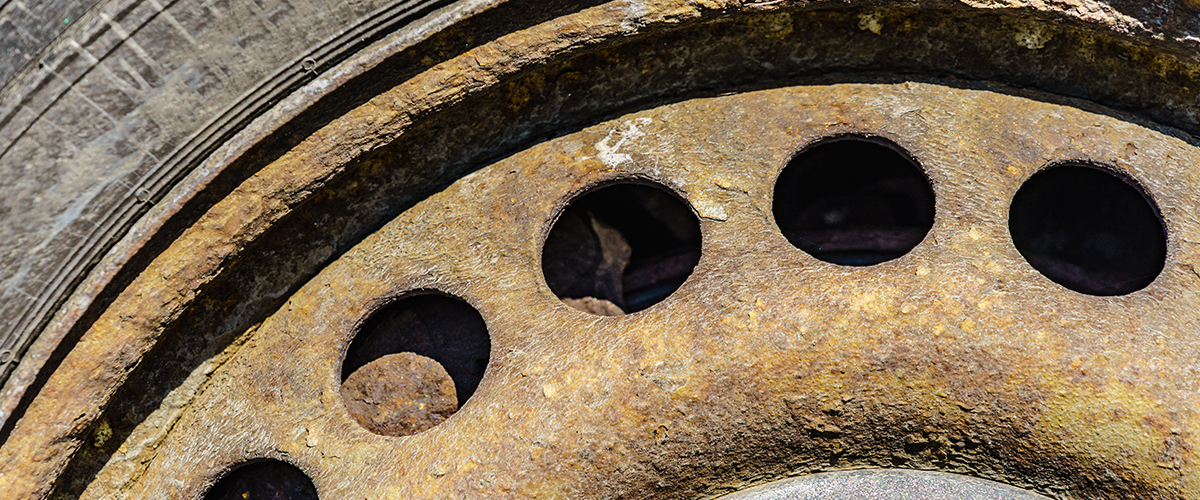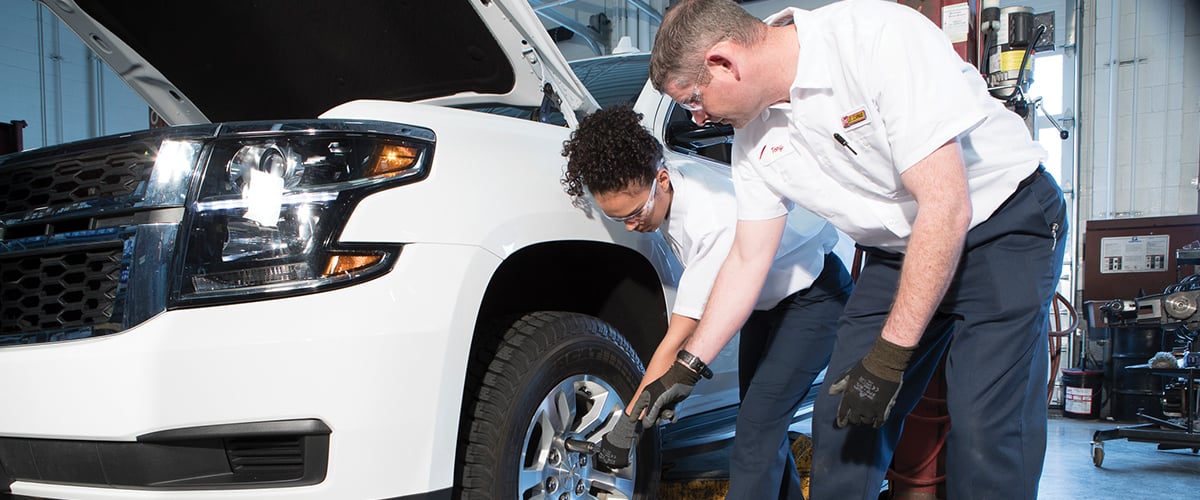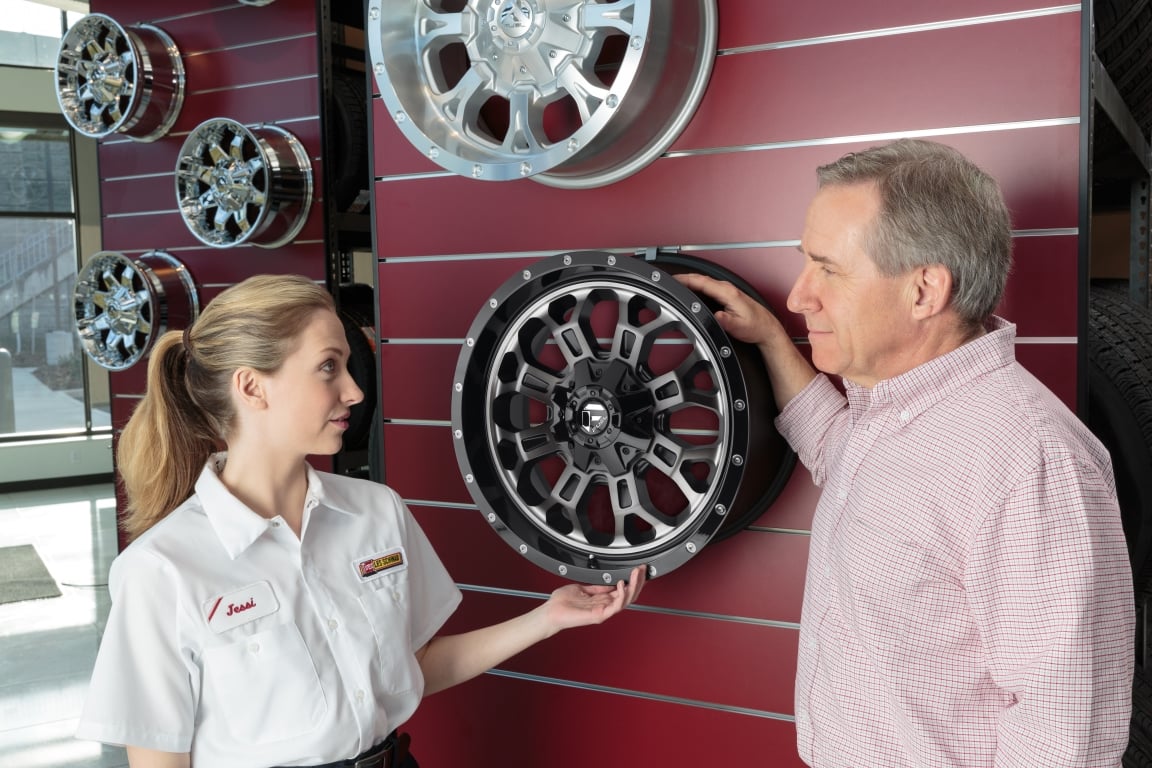Protect Your Wheels from Winter Conditions & Corrosion
The wheels on your car or truck can take a beating in the winter. From ice-melting chemicals (magnesium chloride), salt, cinder, and gravel to unseen potholes, most wheels don’t make it to spring completely unscathed. With some tips and advice from Les Schwab, you can help protect your wheels and get more life out of those sometimes-shiny investments.
Winter’s Impact on Wheels
Depending on where you drive, you’re likely to come in contact with road de-icer and other snow-melting agents. While melting snow and ice on mountain passes and other areas is good for safety, it’s not so good for your vehicle. It’s especially hard on your wheels.
When salt or de-icer comes into contact with snow and ice, the melt that occurs gets everywhere, including your wheels. That chemical compound can slowly eat away at the finish on your rims, causing pits. Eventually, those pits and rust can lead to safety issues. Plus, if you scrape a curb, hit a pothole, or your wheels get pummeled by gravel/crushed rock used to improve road traction, you could develop nicks and chips. Those minor blemishes can give rust a chance to form and spread quickly, causing cracks, flaking, and safety concerns.
If you’re looking for the right wheels to face harsh winter conditions, stop by Les Schwab. Our pros will show you all your wheel options, from aluminum to steel wheels and more.
How to Protect Your Wheels This Winter
The best defense against corrosion and winter wheel damage is to stay clear of all de-icer and road hazards. But since that’s not really possible for most drivers, below are a few ways to protect your wheels this winter:
Keep Your Wheels Clean
Inspect Wheels for Damage

Address Rust Promptly

Consider Winter Wheels
For added protection during the colder months, consider putting your winter tires on a set of winter or steel wheels. This not only prolongs the life of your regular wheels but can also be cost-effective during seasonal changes.
Address Wheel Damage Promptly
Eventually, corrosion will break down even the toughest metals. Ignoring that damage, even when it’s minor, can lead to significant issues, including wheel cracks. By the time you notice even the smallest crack in a wheel, it’s too late. You’ll likely need a new set of wheels for safety.
Types of Wheel Materials and Their Vulnerabilities
Choosing the right type of wheels for your snow tires starts by understanding the differences between your aluminum and steel wheels.
Aluminum (alloy) wheels
Most wheels today are aluminum alloy which may include an aluminum polish, paint, or coating for added wheel protection. These wheels offer a balance of performance, cost, aesthetics, fuel or range economy, and they can withstand a fair amount of winter damage. However, if the protective finish is scratched to reveal the wheel below, corrosion can quickly spread.
Steel wheels
While these wheels are heavier, reducing MPG and range, they are among the best options for winter driving. Especially if they are painted. Moreover, steel wheels are built tough to withstand the impact from potholes and other unseen road hazards. Finally, when you add your winter tires to a dedicated set of steel wheels, you’ll add life to your good-looking, rest-of-the-year wheels. However, if the paint or finish is penetrated, rust can set in fast. See the differences between aluminum and steel wheels.
Carbon fiber wheels
When you want to reduce the weight of your vehicle, improve fuel and range efficiency, and achieve a new level of coolness, carbon fiber wheels are a great choice. But they’re not so great for snow and ice. If you hit a curb just right or roll over a deep pothole, you could crack those wheels. In our opinion, save your carbon fiber wheels for summer driving and use a dedicated set of winter wheels with your winter tires.
Magnesium wheels
At one time these were a slightly popular choice among racing enthusiasts. Today, magnesium wheels are very hard to find. Additionally, they tend to corrode easily and cannot withstand winter road chemicals.
Choosing the Right Winter Tires
Snow tires are specifically designed to withstand harsh winter conditions, provide traction in the snow and ice, and keep you in control when temperatures drop below 40º F. Choosing the right set of snow tires for your driving needs starts at Les Schwab. Our pros will ask some specific questions about where you drive for work and fun, what kinds of conditions you face, and what you need from winter or snow tires.

Find the Right Wheels or Tires At Les Schwab
Protecting your wheels from winter’s punishment starts at Les Schwab. Stop by and ask about wheel protectants as well as free inspections to keep you safe on the road. When it’s time to add a dedicated set of wheels to your winter tires, we’ll be ready to help.

